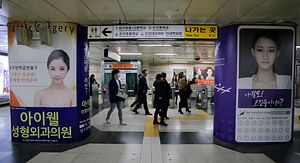South Korea is the plastic surgery capital of the world. It is not rare to see flashy advertisements for cosmetic surgery clinics as you walk down the street or enter the subway in certain areas of Seoul.
The interesting thing is that most of these advertisements are written in Chinese as well as Korean — and sometimes, only in Chinese.
The latest government reports show that some 50,000 foreign nationals visited South Korea last year to get plastic surgery, spending in the region of 215 billion won ($189 million).
More specifically, the number of foreigners visiting plastic surgery clinics increased by 968 from the previous year to 48,849. Foreign patients made up 12.3 percent of the total industry patients. They spent 215 billion won on medical treatment, four times more than the 5.2 billion won spent in 2012 — and almost one-third of this came from Chinese patients. This is the reason that South Korean clinics are eager to promote themselves in the Chinese language.
Having more foreign patients is certainly an opportunity for many cosmetic clinics in the county. However, it has also attracted those who hope to make quick money by scamming those patients.
Brokers are promoting and setting up plastic surgery clinics for foreign patients, charging ridiculously large fees. They take advantage of the fact that many foreign patients lack information and without local language skills their main information sources are the online communities in foreign countries.
For instance, it is easy to find websites operated by brokers popping up on China’s largest internet portal website, Baidu, when searching the keyword “cosmetic surgeries in South Korea.” Of course, some of these sites introduce reputable products and services, but a number of the promotional articles are written by less-principled brokers.
Brokers even hire university students to make their products and services sound more attractive and appealing to youngsters. Since brokers charge large fees to their patients, these students can earn substantially more than pocket money.
Assuming that the domestic cost of double eyelid surgery is usually 800,000 to 120,000 won, charges to Chinese cosmetic surgery tourists can range from 4 million to 5 million won when the brokers get involved.
Meanwhile, nose surgery costs between 1.5 million won and 2 million won, but Chinese tourists will often pay from 3.5 million won to a whopping 20 million won. The brokers, in other words, are charging steep premiums.
The cosmetic surgery industry is concerned about the methods the brokers use, which they worry will undermine South Korea’s potential of becoming a hub for medical tourists in Asia. Its medical technologies, including those for plastic surgeries, are as advanced as in any other leading economy across the world.
The Korea Institute for Health and Industry pointed out that while the number of foreign patients has been on the rise, the improvements in quality have been poor compared to the growth in volume. The institute cited a series of complaints about rampant broker activities, high prices, dissatisfaction with a low-quality service, growing complaints about poor medical practices, increasing concerns about medical safety, and poor guidance for patients regarding treatment.
The institute recommended that the government should intervene to increase the transparency of pricing as a measure that will enable foreign patients to check the actual cost of medical procedures, preventing brokers from taking advantage of foreign patients.
Amid these criticisms and concerns, the South Korean government has laid out a series of plans to crack down on unfair practices and improve the standards within the industry when dealing with foreign patients.
Company executives that hire brokers could face up to three years in prison or fines of 10 million won when caught. The government also plans to introduce a reward system for reporting unscrupulous brokers.
The government has also developed and distributed a series of guidelines for cosmetic clinics and relevant medical institutions while setting up an international support center for foreign patients to deal with various problems, including medical accidents and translation services.
But many believe change should come from the inside rather than from the outside. Members of the Korean Association of Plastic Surgeons are among them.
The association held a press conference last year to urge the industry to introduce more transparent and fairer practices while also welcoming the government’s decision to introduce stricter regulations to crack down on the illegal practices and brokers who take advantage of medical tourists.
“The government’s efforts in monitoring and regulating have had some effect such as reducing the number of illegal brokers who still charge excessive fees,” said Kang Won-kyung, vice president of the association.
But more efforts should continue to be made to help South Korea become a trusted hub for cosmetic surgery and visiting foreign cosmetic tourists, Kang noted.

































